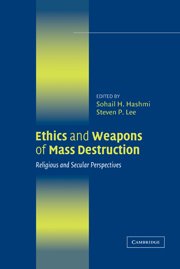Book contents
- Frontmatter
- Contents
- Tables and Figures
- Acknowledgments
- Abbreviations
- Ethics and Weapons of Mass Destruction
- Introduction
- 1 Weapons of Mass Destruction: A Brief Overview
- 2 The International Law Concerning Weapons of Mass Destruction
- PART ONE THE ORIGINAL DEBATE
- PART TWO EXPANDING THE CONVERSATION
- 11 Buddhist Perspectives on Weapons of Mass Destruction
- 12 Buddhism and Weapons of Mass Destruction: An Oxymoron?
- 13 Confucianism and Weapons of Mass Destruction
- 14 “Heaven's Mandate” and the Concept of War in Early Confucianism
- 15 Hinduism and the Ethics of Weapons of Mass Destruction
- 16 Hinduism and Weapons of Mass Destruction: Pacifist, Prudential, and Political
- 17 Islamic Ethics and Weapons of Mass Destruction: An Argument for Nonproliferation
- 18 “Do Not Violate the Limit”: Three Issues in Islamic Thinking on Weapons of Mass Destruction
- 19 Judaism, War, and Weapons of Mass Destruction
- 20 Between the Bible and the Holocaust: Three Sources for Jewish Perspectives on Mass Destruction
- PART THREE CRITICAL PERSPECTIVES
- Contributors
- Index
20 - Between the Bible and the Holocaust: Three Sources for Jewish Perspectives on Mass Destruction
Published online by Cambridge University Press: 05 June 2012
- Frontmatter
- Contents
- Tables and Figures
- Acknowledgments
- Abbreviations
- Ethics and Weapons of Mass Destruction
- Introduction
- 1 Weapons of Mass Destruction: A Brief Overview
- 2 The International Law Concerning Weapons of Mass Destruction
- PART ONE THE ORIGINAL DEBATE
- PART TWO EXPANDING THE CONVERSATION
- 11 Buddhist Perspectives on Weapons of Mass Destruction
- 12 Buddhism and Weapons of Mass Destruction: An Oxymoron?
- 13 Confucianism and Weapons of Mass Destruction
- 14 “Heaven's Mandate” and the Concept of War in Early Confucianism
- 15 Hinduism and the Ethics of Weapons of Mass Destruction
- 16 Hinduism and Weapons of Mass Destruction: Pacifist, Prudential, and Political
- 17 Islamic Ethics and Weapons of Mass Destruction: An Argument for Nonproliferation
- 18 “Do Not Violate the Limit”: Three Issues in Islamic Thinking on Weapons of Mass Destruction
- 19 Judaism, War, and Weapons of Mass Destruction
- 20 Between the Bible and the Holocaust: Three Sources for Jewish Perspectives on Mass Destruction
- PART THREE CRITICAL PERSPECTIVES
- Contributors
- Index
Summary
In the previous chapter, Reuven Kimelman offers a broad survey of how Jewish ethical reflection on war, both halakhic and modern, relates to weapons of mass destruction. By invoking the traditional halakhic principles on when and how wars may be fought, Kimelman is claiming, so I understand, that moral reasoning relating to conventional wars provides a relevant framework for constructing an ethical position on unconventional wars in which WMD are employed. Such an argument casts doubt on the need to distinguish within Jewish military ethics between conventional and unconventional wars. The prohibition against the possession and use of WMD or restrictions on their use would, in this view, be derived from the same ethical principles that apply to the use of military power of any kind.
If my reading of Kimelman's position is correct, then I disagree with his approach. My premise in this chapter is that the ethical basis on which questions of possession and use of WMD must be examined is significantly different from the ethics of conventional warfare. Conventional war ethics, which Kimelman uses as a starting point for his discussion, is devoted to examining the morality of war at two stages: before the war, when the legitimacy of declaring war is considered (jus ad bellum), and during the war, when the proper methods of fighting are evaluated (jus in bello).
- Type
- Chapter
- Information
- Ethics and Weapons of Mass DestructionReligious and Secular Perspectives, pp. 385 - 402Publisher: Cambridge University PressPrint publication year: 2004
- 1
- Cited by

